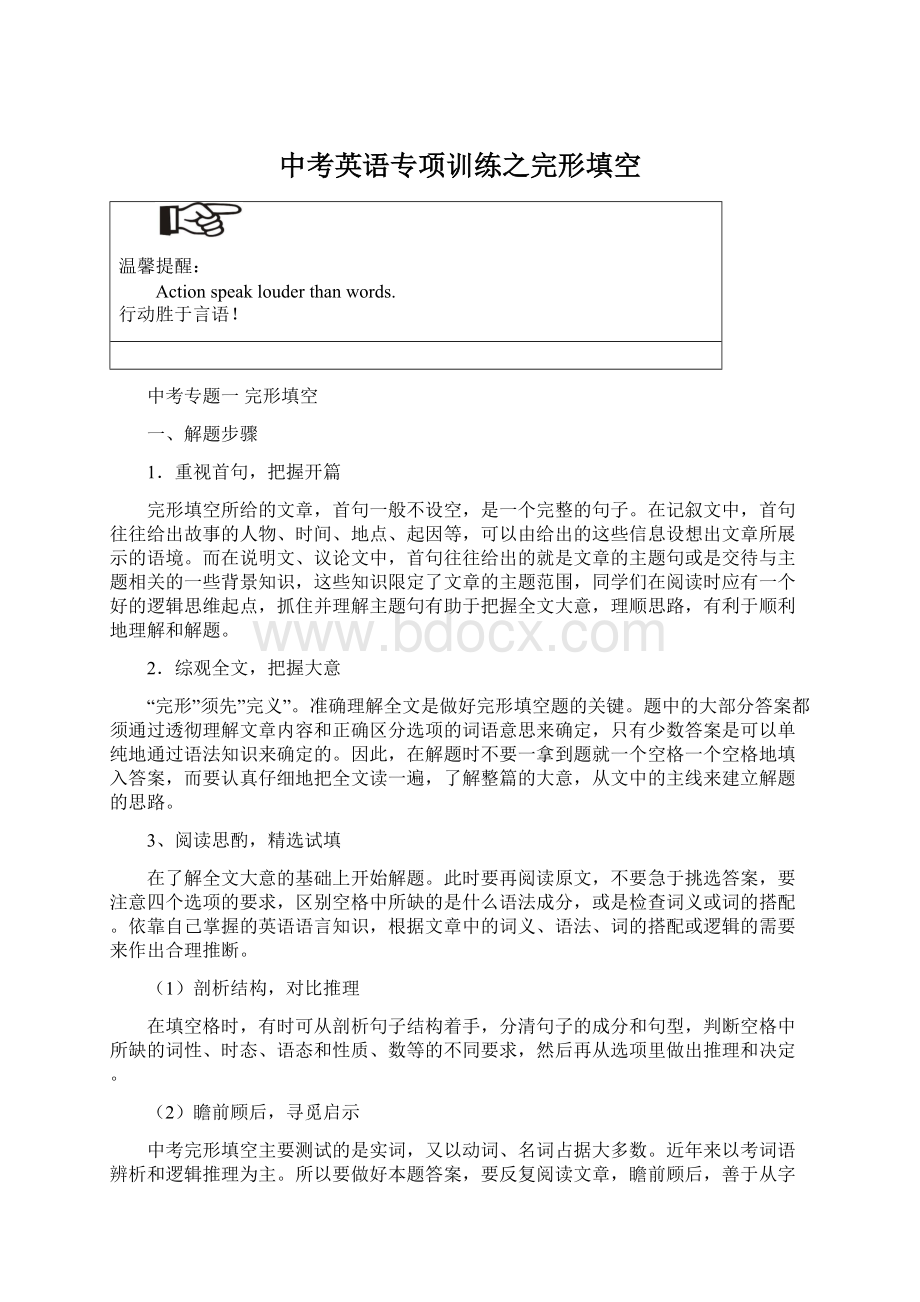中考英语专项训练之完形填空.docx
《中考英语专项训练之完形填空.docx》由会员分享,可在线阅读,更多相关《中考英语专项训练之完形填空.docx(15页珍藏版)》请在冰豆网上搜索。

中考英语专项训练之完形填空
温馨提醒:
Actionspeaklouderthanwords.
行动胜于言语!
中考专题一完形填空
一、解题步骤
1.重视首句,把握开篇
完形填空所给的文章,首句一般不设空,是一个完整的句子。
在记叙文中,首句往往给出故事的人物、时间、地点、起因等,可以由给出的这些信息设想出文章所展示的语境。
而在说明文、议论文中,首句往往给出的就是文章的主题句或是交待与主题相关的一些背景知识,这些知识限定了文章的主题范围,同学们在阅读时应有一个好的逻辑思维起点,抓住并理解主题句有助于把握全文大意,理顺思路,有利于顺利地理解和解题。
2.综观全文,把握大意
“完形”须先”完义”。
准确理解全文是做好完形填空题的关键。
题中的大部分答案都须通过透彻理解文章内容和正确区分选项的词语意思来确定,只有少数答案是可以单纯地通过语法知识来确定的。
因此,在解题时不要一拿到题就一个空格一个空格地填入答案,而要认真仔细地把全文读一遍,了解整篇的大意,从文中的主线来建立解题的思路。
3、阅读思酌,精选试填
在了解全文大意的基础上开始解题。
此时要再阅读原文,不要急于挑选答案,要注意四个选项的要求,区别空格中所缺的是什么语法成分,或是检查词义或词的搭配。
依靠自己掌握的英语语言知识,根据文章中的词义、语法、词的搭配或逻辑的需要来作出合理推断。
(1)剖析结构,对比推理
在填空格时,有时可从剖析句子结构着手,分清句子的成分和句型,判断空格中所缺的词性、时态、语态和性质、数等的不同要求,然后再从选项里做出推理和决定。
(2)瞻前顾后,寻觅启示
中考完形填空主要测试的是实词,又以动词、名词占据大多数。
近年来以考词语辨析和逻辑推理为主。
所以要做好本题答案,要反复阅读文章,瞻前顾后,善于从字里行间寻找内容上的逻辑关系,理清纹理脉络。
要结合上下句,了解相互间的关系。
形成整体观念,透彻地理解空格中所要求的词。
如果我们仅从个别句子本身考虑,在语法和意思上正确的答案可能有几个。
只有结合前后句子,分析判断,区别选择项,排除干扰项,才能选出正确答案或是最佳答案。
要善于抓关联词语,前后搭配。
如but,infact,while表示转折;and,aswellas,besides等表示并列;so,therefore,asaresult等表示因果。
识别这些词的功能,有助于抓住文章的脉络,进行理解和延续。
(3)根据常识,联想推断
在解题过程中,我们还须根据生活常识、共同的经历、风俗习惯、英美概况和科技知识来理解短文,进行推断,从而找到正确答案。
所以,平时我们一定要注意各方面知识的积累。
(4)暂缓定词,以易助难
在解题过程中,一旦遇上一时难以确定的答案,可以暂时先搁一下,先做后面的空格。
实际上,有的空格只有确定了后面的某个或某几个答案后,才能确定原来那个空格的确切答案。
有的前后答案是相互呼应、相互依存的。
因此,有时在确定后面的答案后,会突然想到前面的某个答案选得不妥,于是再作修改。
在填完大部分空格后,全文的意思已基本显露而趋于完整时,剩下的个别较难的空格也就容易做了。
(5)排除干扰,仔细鉴别
在填空格时,有时采用上述方法仍无法确定,可采用逐一排除干扰项的方法。
首先,去除在语法上和内容上有明显错误或不合要求的选项,然后再对剩下的选项或词语正确而语法上不恰当的选项,就需要仔细鉴别,把它们逐一填入空格,通过上下文进行比较,选出最佳答案。
4.重读全文,校核答案
在填完全部空格后,应该将全文仔细通读一遍,从全篇的高度来审视一切,看全文的意思是否融会贯通,各段之间、前后之间的内在逻辑关系是否一致。
再检查一下前后的人称、时态、主谓关系、语态、语气以及词的搭配等是否正确。
如有疑问,再阅读上下文以致全文,仔细斟酌,修改不合理的部分,以防止因逐句选择造成的片面性错误,从而进一步提高答题的正确率。
(一)从上下文及全篇理解的角度考虑
解题示例分析:
(1)Aneleven-year-oldboyinasmalltownwantedtobecomeatraindriver.Buttheboywasbornwithout1.Hisfathertaughthimto2hisfeetas"hands".
(B)1.A.feetB.armsC.legsD.ears
(C)2.A.liftB.lookC.useD.think
(2)TheyoungermembersofmostAmericanfamiliesdon'tlikeforeignfood.Theylikehamburgers.Theirideaofa1mealisahamburger,servedwithketchupandFrenchfriedpotatoes,whichare2Frenchfries.Frenchfriesarenotconsideredforeign;mostAmericanchildrenandteenagers3toeatthemanytimeofthedayornight.
(B)1.A.badB.good C.expensiveD.cheap
(A)2.A.calledB.cookedC.made D.invented
(C)3.A.hateB.start C.love D.enjoy
(二)从上下文语境,辨析词语、词义
(1)Whenhewasnearthetown,aworkercaughtupwiththetrainandstoppedit.Atfirsthewasvery1,buthelaughedwhentheboysaid,"Ilike2"."Well,I'mgladyoudon’tlikeplanes!
(C)1.A.happyB.gladC.angry D.hungry
(D)2.A.busesB.bikesC.planesD.trains
(2)I'mverysorry.Iborrowedabooktendaysago.ButIcan't1it.IthinkI'velostit.
(D)1.A.seeB.lookC.lookforD.find
(三)从搭配、惯用法及常识的角度考虑
(1)Hecouldn'tgotoschool,sohe3allhistimewatchingtrains4andgoingbecausehelivednearthestation.Howhewantedto5atraindriver!
(D)3.A.costB.paid C.took D.spent
(A)4.A.comingB.running C.flyingD.walking
(D)5.A.amB.is C.areD.be
(2)Ourschoolhasabiglibrary.Therearemany1init.
(D)1.AkindofbookB.kindofbooks
C.kindsofbookD.kindsofbooks
二、实例点拨
请根据下面短文内容,在短文后面的四个选项中选择一个能填入空白处的最佳答案。
EveryyearstudentsinmanycountrieslearnEnglish.Someofthesestudentsarechildren,__1__studentsareyoungpeople.Whydoallthesepeoplewanttolearn__2__?
Itisnot__3__toanswerthisquestion.ManyboysandgirlslearnEnglishatschool.Itisoneoftheir__4__.ManypeoplelearnEnglishbecauseitis__5__intheirwork.SomeyoungpeoplelearnEnglish__6__theirhigherstudiesbecausesomeoftheirbooksare__7__English.OtherpeoplelearnEnglishbecausetheywantto__8__newspapersinEnglish.SomepeoplelearnEnglishbecausetheywantto__9__intheUSA,EnglandorAustralia.Englishisvery__10__inourlife.
1.A.allB.theother C.bothD.other
2.A.EnglishB.Chinese C.mathsD.Japanese
3.A.hardB.easyC.goodD.nice
4.A.booksB.classes C.schoolsD.subjects
5.A.goodB.useful C.fineD.pleased
6.A.forB.ofC.toD.from
7.A.inB.withC.atD.of
8.A.lookB.seeC.lookatD.read
9.A.goB.workC.likeD.come
10.A.helpB.helping C.helpsD.helpful
答题分三步:
第一步:
通览全文
通过通览全文,便知本文讲述许多人学习英语。
学习英语的人年龄不同,目的各异。
第二步:
逐项填空
本着先易后难的原则,先根据上下文和自己的语感,推测部分空格的可能答案。
然后,再结合选项逐一敲定。
1.选B。
some...other(s)...意思是"一些......另一些(泛指)";some...theother(s)...意思是"一些......另一些(特指)"。
由语境可知,在学英语的学生中,除一部分是孩子外,剩余的是青年人(特指)。
2.选A。
根据上下文可知是English。
3.选B。
由文章内容来看,人们学习英语的原因多种多样,因此回答为什么那么多人学习英语这个问题并不容易。
4.选D。
由常识可知,English是学生学习的科目(subject)之一。
5.选B。
根据前后文意可知许多人学习英语,那是因为English在他们的工作中很有用(useful)。
6.选A。
本题属于介词用法辨析。
介词for在此可表示目的、原因。
7.选A。
inEnglish是习惯搭配。
8.选D。
"读报"英语习惯说read newspapers。
9.选B。
根据语境及句子结构,有些人学习英语或想出国(gotoacountry)或想在这些国家工作(workinacountry)。
10.选D。
末句点题,"英语在我们生活中是很有帮助的(helpful)"。
第三步:
复读检验
将所有答案代入空格后,重新将短文复读一遍,如果语句通顺,语意清楚,便结束本题,转做其它试题。
最后须提醒大家一点,做好完形填空题并非一日之功。
我们应从平日学习中做起,多积累,勤学苦练,方可成功!
Haveagreatersuccessinthefuture!
三、专项训练
(1)
根据文意,补全所缺单词,词首字母已给出。
OverheadbridgescanbeseeninmanypartsofSingapore,intheplaceswheretrafficisveryh_____andcrossingtheroadisnotsafe.
Thesebridgescanhelppeoplecrossroadss_____.Overheadbridgesareusedinverymuchthesamewayaszebracrossings(斑马线).
Theyaremoreefficient(效率高的),t_____lessconvenient(方便的)becausepeoplehavetoclimbupalotofsteps.Thisisinconvenienttotheold.Whenpeopleu_____anoverheadbridge,theydonotholdup(阻挡)traffic.Butwhentheycrossabusyroadusingazebracrossing,trafficisheldup.Thisisw_____thegovernment(政府)hasbuiltmanyoverheadbridgestohelppeopleandk_____trafficmovingatthesametime.
ThegovernmentofSingaporehass_____alotofmoneybuildingthesebridges.Fortheirownsafety,peopleshouldbeadvisedtousetheminsteadofrushingacrosstheroad.Oldpeoplemayfinditalittled_____climbingupanddownthesteps,butitisstillmuchsaferthanwalkingacrosstheroadw_____allthemovingtraffic.
Overheadbridgesareveryuseful.People,botholdandyoung,shouldalwaysusethem.Thiswillstopaccidentsfromh_____.
Key:
1.Heavy2.safely(作状语应用副词形式)3.though(此处表让步关系,意为"虽然")
4.Use5.why(此处表达"这就是......的原因)6.keep
7.spent(spendtime/moneyin/ondoingsth.意为"花时间/金钱做某事",其中in常省略)8.Difficult9.with
10.happening(stop...fromdoing)意为"阻止/防止......去做某事")
(2)
Thepopulationproblemmaybethe1oneoftheworldtoday.Theworld'spopulationisgrowing2.Twothousandyearsago,therewereonly250millionpeople3theearth.Fourhundredyearsago,thenumberwas4500million.Butatthebeginningofthe5century,theworld'spopulationwasabout1,700million.In1970,thisnumberwas3,600million.In1990,thenumberwasfivebillion.A6reportsaysthattheworldpopulationwill7sixbillionbytheendofthe20thcentury.Thisisjustten8fterit9fivebillion.Peoplesaythatbytheyear2010,10maybesevenbillion.
1.A.greatB.greaterC.greatestD.greating
2.A.fasterandfasterB.fastandfastC.fastestandfastestD.fasterandfast
3.A.inB.onC.atD.for
4.A.nearlyB.moreC.almostD.over
5.A.twentyB.twelveC.twentiethD.twelfth
6.A.USAB.UNC.PRCD.PLA
7.A.pastB.passC.passedD.passes
8.A.weeksB.monthsC.seasonsD.years
9.A.getB.getsC.reachedD.reach
10.A.thisB.itsC.oneD.it
KEY:
1.C2.A3.B4.D5.C6.B7.B8.D9.C10.D
(3)
Firecanhelppeopleinmanyways.Butitcanalsobeveryharmful(有害的).Firecankeepyourhouse__1__,givelightandcookfood.Butfirecanburnthings__2__.Bigfirecanburn,trees,houses,animalsorpeople.Nobodyknowshowpeoplebegantousefire.Butthereare__3__.interestingoldstoriesabouthowamanorwomanstartedafire.Oneis__4__aman.Theman__5__averylongtimeago.Hewentupthesunand__6__firedown.Todaypeopleknowhowtomakeafirewithmatches(火柴).Childrensometimes__7__toplaywiththem.Butmatchescanbeverydangerous.Onematchcanburnapieceofpaper.and__8__itcouldburnahouse.Asmallfirecanturnabigfire.veryquickly.Soyou__9__becarefulwithmatches.
Becarefulwithfire,anditwill__10__you.Butifyouaren'tcarefulwithfire.anditmayhurtyou.
1.A.warm B.warmer C.cool D.cooler
2.A.also B.too C.either D.neither
3.A.many B.much C.little D.no
4.A.over B.about C.alittle D.no
5.A.workedB.studied C.learned D.lived
6.A.bring B.take C.brought D.took
7.A.enjoyB.like C.don'tlikeD.become
8.A.afterB.late C.yet D.then
9.A.can B.man C.will D.must
10.A.help B.do C.tell D.hope
Key:
1.C 2.C 3.D 4.C 5.A 6.B 7.D 8.A 9.B 10.D
(4)
EnglishnamesandChinesenamesarequitedifferentinsome1ways,butit'snothardforustoknow.UnlikeChinese,mostEnglishpeoplehave2names.Oneistheirfamilyname,bothoftheothernamesaregivennames.Theirfamilynameis3thegivenname.TheyuseMr,MrsorMisswiththe4name,buttheyneveruse5withthefirstname.Forexample,wecan6amannamedJamesAllanGreenMrGreen,7wecan'tcallhimMrJamesorMrAllan.PeopleusuallyuseJim8James.JimisshortforJamesbecauseit's9toremember.ButChinesenamesaretheopposite.AgirlwiththenameHanLimei10herfamilynameHanfirst.Ofcourse,shecanbecalledAhMeiforshortinChinaifyouwish.
1.A.anotherB.otherC.othersD.theothers
2.A.oneB.twoC.threeD.four
3.A.aboveB.frontC.backD.behind
4.A.lastB.givenC.middleD.full
5.A.theirB.themC.itsD.it
6.A.askB.sayC.callD.write
7.A.s